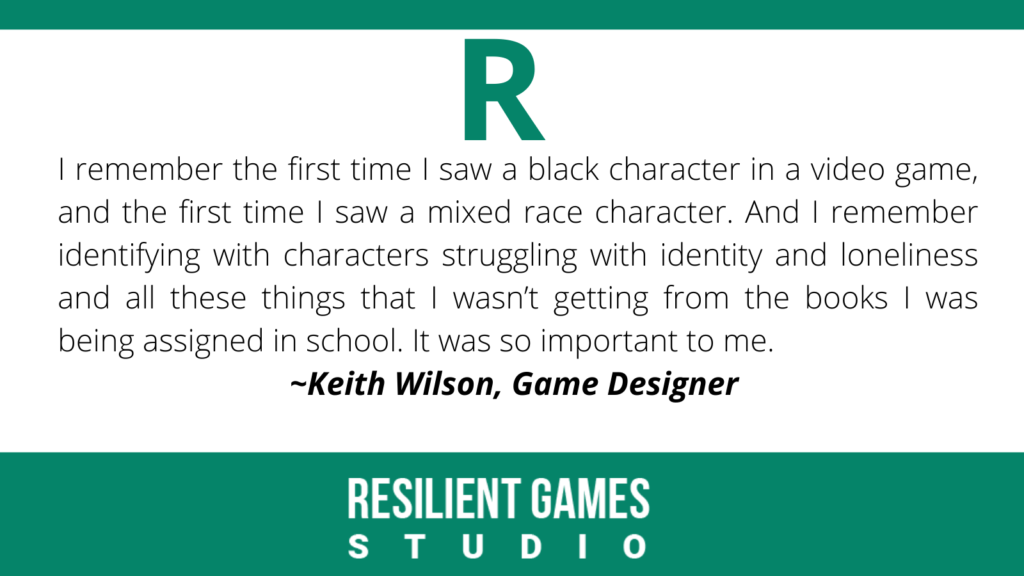Q&A: Keith Wilson, RGS Game Designer & Writer
What can you tell us about your trajectory as a writer, poet and game designer? How do they inform your current role at RGS?
My dad was the first gamer I ever knew. He bought a console for himself–and as a very very young child I remember having to ask permission to play his Nintendo. Eventually he gave up control, but the games he bought were games he was interested in, which meant I was playing games that a lot of kids weren’t interested in at the time. I grew up playing a lot of text-heavy story-based games and vividly recall looking up or asking about words I had never experienced before (in Final Fantasy 6, a character says at one one point “Semantic nonsense!”). That is the story of my attachment to games and games writing. I was also a voracious reader and writer, and my parents encouraged it by trying to make sure I always had something to read. I think one of the great things that kids do is question everything. But another thing they do is sometimes they don’t know there is something TO question, so as a kid I didn’t distinguish between the writing that I read in video games and the writing I read in books. I thought they were equally ripe with possibility and I still believe that. At RGS, I try to express that in the things I design and create: games and writing are full of possibility, and what can I do to express that to an audience that maybe has never experienced it?
What advice do you have for emerging game designers who want to make a difference?
It is such a simple thing: know that you can make a difference. It’s true that there are parts of the culture that believe that games don’t matter (people who think something is “only a game” and therefore you shouldn’t spend any time thinking or caring about it). But there are also a ton of people to whom this is an avenue to recognize or be recognized. I remember the first time I saw a black character in a video game, and the first time I saw a mixed race character. And I remember identifying with characters struggling with identity and loneliness and all these things that I wasn’t getting from the books I was being assigned in school. It was so important to me.
Can you give us a sneak peek in your day-to-day when it comes to designing a current game with one of our partners?
There isn’t just one way! But I think the key thing I’ve learned from game designers and computer programmers is the value of iteration. Basically, after considering what a partner is aiming to do, and considering what I think is the best approach to try to achieve that, I try to create something. Once you have actively created a thing, there is something on the table to talk about. Can we build from this? Should we start over? This is the most fun part of the process for me. It can mean doing extremely rough coding of something, or it can mean markers on paper.
What are you seeing emerge in the gaming industry when it comes to interactive learning
I think the main thing I am seeing is a growing acceptance of interactive learning to begin with. Once upon a time, classes taught that nothing was better research than finding a book on the topic, and we were taught the internet was not an acceptable primary source. That has changed, and with that change are a ton of far reaching, extremely powerful resources that couldn’t exist in a book (videos and games for instance). Similarly, the game industry is able to explore avenues of learning that totally change how we learn. A really simple example most folks know about is Duolingo. It is wild to me that I can practice Spanish for 15 minutes a day no matter where I am. That I can listen to someone speak it, and speak it aloud. It’s not the same as being in a classroom with an instructor, but it also doesn’t have to be: sometimes games are a supplement to traditional learning. I know if I had games to play outside of my language classes in high school I would have retained far more than I did.
What excites you most about the work at RGS?
I love that I get to work on games that matter to me. And I love working with people who recognize and care about games as catalyzing elements in large portions of our community. Can you imagine if we just felt that all music didn’t really matter, and made music as if it couldn’t really make a difference in someone’s life? If we said that all music only existed to play around with when you were bored? How many people would we miss the opportunity to connect with? I love that RGS is making those connections

Step Up: An Educational Video Game
Step Up: An Educational Video Game Addresses Racial and Gender Bias and Harassment in Support of Students’ STEM Career Journey Resilient Games Studio (RGS) recently...
READ MOREMeet Noah Bellemare, Game Developer & Producer
Meet Noah Bellemare, Game Developer & Producer When did you start with Resilient Games Studio (RGS), and what do you enjoy most about the game studio? I began working...
READ MORE